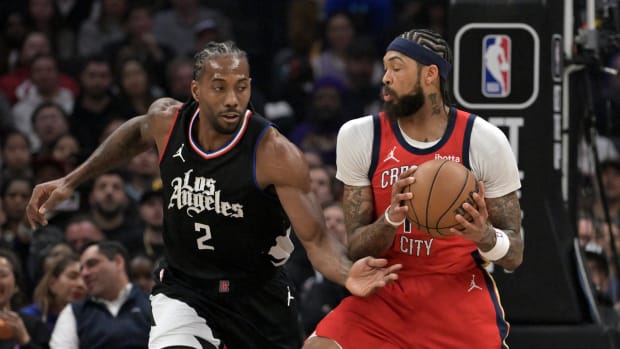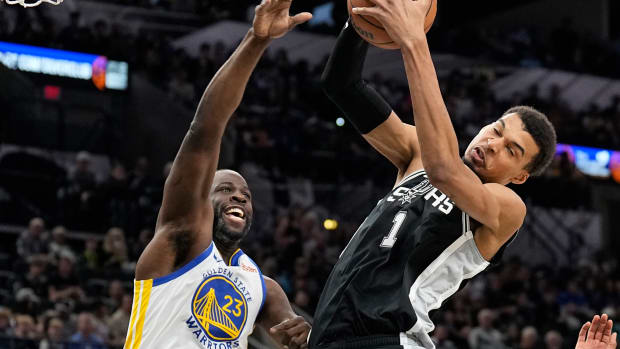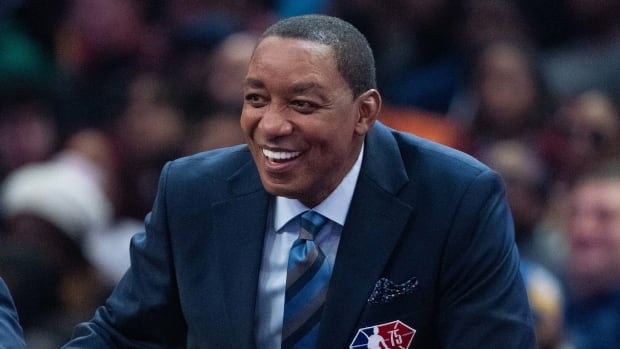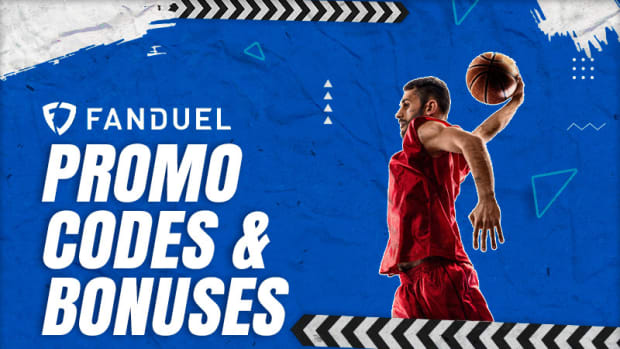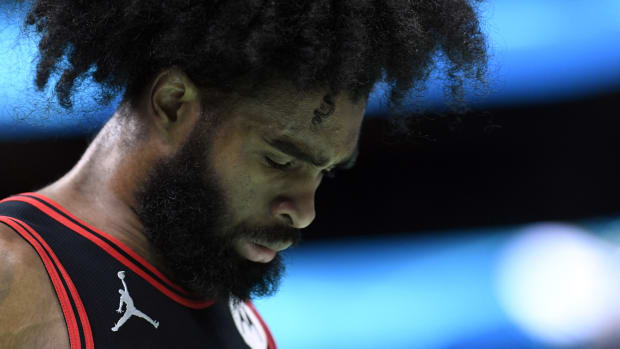Dwyane Wade on End of Heat's Big Three and NBA Ownership
Presumably because he was busy with one of his several post-basketball endeavors, Dwyane Wade wasn’t watching when the Jazz—the team he owns a minority stake in—and the Heat—the team he won three championships with—squared off in Miami earlier this November. If he had been watching that game (a Heat win), though, Wade would not have been conflicted.
“I don’t really have any emotions,” Wade tells Sports Illustrated about his two teams facing each other. “I'm a Miami Heat as a basketball player. Anytime I see that jersey, anytime I see a hat, anytime somebody utters the word ‘Miami,’ I feel a sense of pride and joy.
“But I also understand the personal from the business. I've been affected by the business many times. And so I can separate my personal feelings of my love for the organization that I gave everything to from the organization that I'm getting to know that started from a business standpoint.”
For those yearning for the personal side of Wade, they need to look no further than his latest book, a photo memoir succinctly titled Dwyane. Consisting of over 200 photos from throughout Wade’s career both on and off the court, the book is a gentle trip down memory lane with one of the NBA’s greats.
In a conversation with SI, Wade discussed the book, his role as a player turned owner, and more.
Sports Illustrated: On page 88 of the book, there’s a photo of the Big Three in a pool after the 2014 Eastern Conference finals, and in the book you write, “It was one of the last times the three of us laughed together as teammates. I think we all sort of knew 2014 was the end of the run. But none of us really addressed it throughout the season.” If you think back, what gave you the sense that this could be the end?
Dwyane Wade: I think all of us were hopeful that we could figure out a way to be like the Spurs. Retool, add a few pieces, and keep the thing going, right? You're hopeful. But when you go on throughout the process, this was a different four years, this was four years with us being the most hated team in the world, right? This started heavy. And I just felt at the end of it, it weighed on a lot of us heavily, physically, mentally, emotionally. I thought we all needed to breathe. And you know, you could just feel it, you could just feel the things that were cool weren't cool no more. The jokes that were funny weren't funny anymore. The rules on the team started to tighten up, and we wanted it loose. It was just a lot of things that you can feel over the course of time. The play, we were just kind of going through the motions in 2014. We couldn't find that switch that we needed.
Udonis [Haslem] knows, I talked to him more than anybody. It was a moment where I even was like, “I don't think Bron gon’ be here next year.” You know, when I look back at this photo, I remember this was in the playoffs, and I remember just savoring every moment. Because I knew that we all had our doubts and it didn't look like we were retooling. It looked like we were old. And we were getting older. I knew I was. And so I knew that it was a possibility that was gonna be our last run.
SI: This book is not just about basketball. You talk about your old agent, friend and mentor Henry Thomas. You talk about your family as well. You’ve always been pretty open about these different things in your life. How do you decide where the line is on what you want to let people into about your life? Do you feel like you even get to choose anymore on how much you get to share?
DW: In the world we live in, you have moments where you can't control it. We’re able to put out social content, and we're able to do certain things. Everyone's controlling the narrative of what people think about them, whether it's right or wrong. But you know, most of the time when you're playing a sport, most of the words written about you are not your words. You got to trust that other people can take what you've done and take their five to 10 minutes around you and write something great about you and tell a story that your fans can read.
So for me, that was one of the reasons I did this book. Because for one of the first times I wanted to kind of tell my own story. I wanted people to hear my own thoughts, my inner thoughts, what the hell was I thinking and going through in that moment? I live a very public life. And I have certain moments that are just for me and for my family, but 85% of them the world knows about. So I can't run from it, I can't hide from it. I gotta jump in and embrace it the best way possible. And so anytime I get a chance to do my own documentary, or do my own book, or do certain things, I'm controlling my own story. And that's the way you want it.
SI: You’re one of the few people who’ve played a professional sports and then also gone into ownership after. There have been things like the Suns story in the news recently. From your experience, how would you describe the dynamic between players and ownership in the NBA? Is there tension there?
DW: From my experience—obviously not knowing every relationship—I mean, you see some out there like Mark Cuban and Dirk [Nowitzki], and it looks amazing. The ownership group and the chairmans in Miami with the Arison family, they were great to my family and I.
I just feel that the tough part about it is, most of the people who own teams, most of the people who are in ownership of teams, have never played a sport at the highest level. And so it's hard to communicate and to be on the same page when you come from two totally different worlds. And sometimes the ownership group is in it for the investment only, right? And they're not in it the same way the players are in it. Like some of these players, this is all they have, and whatever will have. Coaches and players are close because the coaches are in the grind with you. You see them every day, you see them have hard moments, you see them break down. You don't get a chance to see the ownership group like that. So in a sense, the ownership group is separate from the team. And our goal [in Utah] and hopefully the goal in the future, is to see how you can merge between player and owner. And if our goal is partnership, if our goal is one common goal, then we have to figure out a way to merge that gap because it's a big separation.
It’s not a lot of trust in ownership and player because once again, you don't really talk to ownership in that way. A lot of owners are not even around like that. That’s one of the things that I'm excited about starting with Donovan [Mitchell], is to be able to try to have that regular constant communication. As owners you can’t fix what the problem is if you don't know. So really just having communication, that solves most things in any relationship. And it's nonexistent in most relationships between player and ownership. Maybe the star may have a relationship, but the 15th guy doesn't, the 14th guy doesn't. Relationships are not being nurtured ever, really, because the NBA is set up on hierarchy and so it's so many different people with so much different red tape you have to go through before you get to the star player or the owner.
SI: There’s a photo of you and Rick Ross in the studio together in the book. Can you please tell me one Rick Ross story?
DW: One of the cool moments for me was at the end of my last year, I had a few things that I wanted to accomplish. And this photographic memoir was one of them. But also because I have my own shoe line, I wanted to do something for the city. I call up my guy and I ask him to come to my house. He came to my house, it’s Rick and I sitting out on the dock. He has his guys there, I have my shoe designs out. He brings a big bottle of Belaire—I'm talking about a huge bottle. We’re sitting on the dock, chef is bringing out drinks and it's a beautiful setting. It's Miami, it’s a water view and everything's going well.
I'm talking to Rick about this shoe and the collabs that I want to do. And he looks at me and says, “I need you to do something for me.” And I'm like, “Bro, name it, done.” He says, “I need you to jump on a track. I said, “What? Huh?” He’s like, “Bro, I need us to do this for the city.” And I had a quick moment where I was like, I can't do that. And then I was like, This is Rick Ross. This is one of my top five. Like I have to get in the studio with him, even if I make a fool of myself. And so that photo was that night where after the game, he came to the game that day we won and we had a good game. I saw him at the game on the court and I said, “Yo, I think I'm ready to come to the studio, bro.” UD and I went over there, man, and we did it.
More NBA Coverage:
• The Warriors Are Relishing the Skepticism
• NBA Power Rankings: Warriors and Nets Battle for No. 1
• Three Strange Developments In the Eastern Conference
• Kevin Durant and Stephen Curry Lead NBA MVP Race































